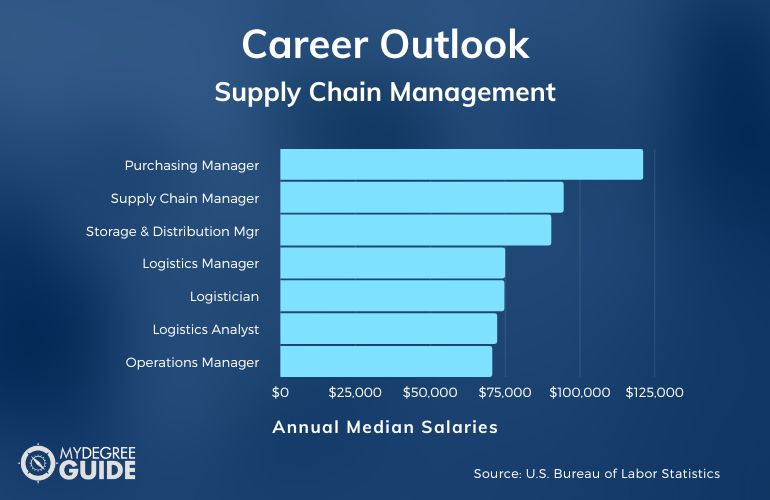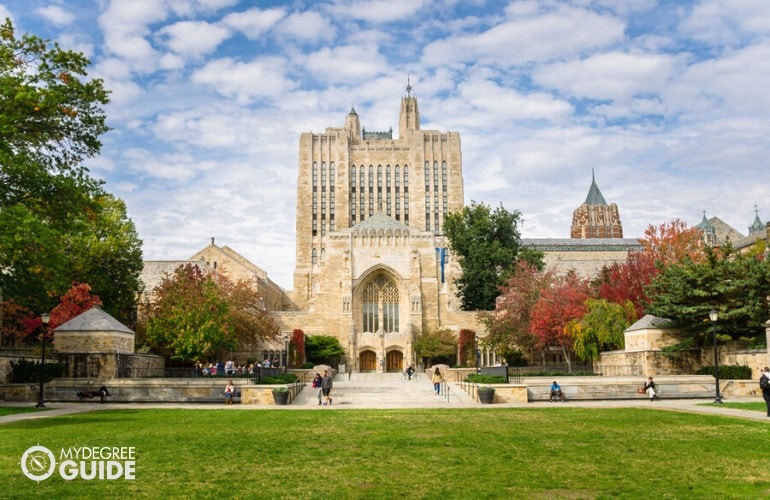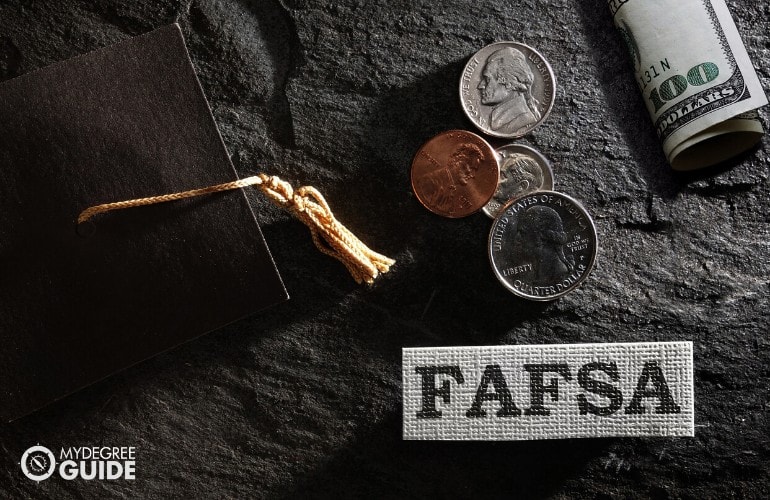What can an online masters in supply chain management no GMAT do for you?

Every day, companies move materials and goods from one place to another as supply chain management professionals oversee the process.
To become a leader who heads up distribution, transportation or inventory, it’s smart to earn a master’s degree in supply chain management.
Editorial Listing ShortCode:
Universities Offering Online Masters in Supply Chain Management No GMAT Required
These accredited universities all offer a master’s degree in supply chain management with no GMAT scores required for admission.
1. Athens State University
Athens State University is a publicly-run school that has a campus in Athens, Alabama. It was established in 1822 as a female exclusive training school called the Athens Female Academy. In the past, it had a close affiliation with the Methodist Church. Currently, its enrollment is at about 3,500 students, and their sports teams are called the “Bears.”
- MS Global Logistics and Supply Chain Management
Athens State University is accredited by the Southern Association of Colleges and Schools Commission on Colleges.
2. Boston University
Boston University is a privately-owned research university that has a 135-acre urban campus in Boston, Massachusetts. It was established in 1839 as the Newbury Biblical Institute and had a strong affiliation with the Methodist Church, though presently, BU has declared itself to be nonsectarian.
The school has a total enrollment of about 35,000 students, and their sports teams, the “Terriers,” play in the NCAA Division I.
- Master of Science in Supply Chain Management
Boston University is accredited by the New England Commission of Higher Education.
3. Charleston Southern University
Charleston Southern University is a privately-owned, independent, and comprehensive university that owns and operates a 300-acre campus in North Charleston, South Carolina. It was established in 1964 by the South Carolina Baptist Convention.
At present, there are about 4,000 students enrolled in this school. Their sports teams are called the “Buccaneers,” and they play in the NCAA Division I.
- Master of Science in Supply Chain Management
Charleston Southern University is accredited by the Southern Association of Colleges and Schools Commission on Colleges.
4. East Carolina University
East Carolina University is a public, state-run research university that has a 530-acre urban main campus in Greenville, North Carolina. It was established in 1907 to train teachers and serve as a high school. There are about 30,000 students enrolled each term. Their sports teams are called the “Pirates,” and they play in the NCAA Division I.
- MBA – Operations and Supply Chain Management
East Carolina University is accredited by the Commission on Colleges of the Southern Association of Colleges and Schools.
5. Georgia College & State University
Georgia College is a public state-run school that manages a campus in Milledgeville, Georgia. It was established in 1889 to provide training for women to become future teachers or train them in vocational, more industrial jobs. The current enrollment is about 7,000 students. The sports teams of Georgia College are called the “Bobcats,” and they play in the NCAA Division II.
- Master’s degree in Logistics and Supply Chain Management
Georgia College & State University is accredited by the Southern Association of Colleges and Schools Commission on Colleges.
6. Golden Gate University
Georgia College is a public state-run school that manages a campus in Milledgeville, Georgia. It was established in 1889 to provide training for women to become future teachers or train them in vocational, more industrial jobs. The current enrollment is about 7,000 students. The sports teams of Georgia College are called the “Bobcats,” and they play in the NCAA Division II.
- MBA in Global Supply Chain Management
Golden Gate University has been accredited on an institution-wide basis by the Western Association of Schools and Colleges (WASC) since 1959.
7. Governors State University
Established in 1969, Governors State University is a public school that has a suburban campus in University Park, Illinois. They were pioneers in ranking students with competencies instead of grades. The current average enrollment is about 6,000 students. Their sports teams are called the “Jaguars,” and they play in the NAIA.
- MBA in Supply Chain Management
Governors State University is accredited by the Higher Learning Commission of the North Central Association of Colleges and Schools.
8. Johnson & Wales University
Established in 1914 as a normal school, Johnson & Wales University is a privately administrated, non-profit school that has campuses in Providence, Rhode Island, Charlotte, North Carolina, Miami, Florida, and Denver, Colorado. Currently, it has a total enrollment of 13,000 students for all four campuses, and their sports teams are called the “Wildcats.”
- MBA – Operations and Supply Chain Management
JWU is accredited by the New England Commission of Higher Education (NECHE), through its Commission on Institutions of Higher Education (CIHE).
9. Liberty University
Founded in 1971, Liberty University is a privately-operated, non-profit university that has a 7,000-acre suburban campus in Lynchburg, Virginia. From the beginning, Liberty University has had a strong affiliation with the Southern Baptist Church.
The school’s current enrollment is about 100,000 students, 95,000 of which are online. Their sports teams are called the “Liberty Flames” and “Lady Flames.”
- MBA in Supply Chain Management and Logistics
Liberty University is accredited by the Southern Association of Colleges and Schools Commission on Colleges.
10. Lindenwood University
Lindenwood University is a privately-managed liberal arts school that has a 500-acre urban campus in St. Charles, Missouri. It was established in 1827 to provide education to women in the community.
The current average enrollment is over 7,400 students, more than 6,400 of which are undergrads. Their sports teams are called the “Lions,” and they play in the NCAA Division II.
- MBA in Supply Chain Management
LU has full accreditation from the Higher Learning Commission (HLC).
11. Louisiana State University
Louisiana State University is a state-run public university that has a 4,925-acre urban campus in Baton Rouge, Louisiana. It was established in 1860 as a land grant university. The current enrollment is at about 30,000 students, more than 25,000 of which are undergrads. Their sports teams are called the “Tigers” and “Lady Tigers,” and they play in the NCAA Division I.
- MBA – Supply Chain Management
Louisiana State University is accredited by the Southern Association of Colleges and Schools Commission on Colleges.
12. Loyola University – Chicago
Loyola University Chicago is a privately-owned research university that has a very strong affiliation with the Catholic Church because it was founded in 1870 by the Jesuits. It maintains a campus in Chicago, Illinois, and it has a current enrollment of about 16,000 students. Currently, they play in the NCAA Division I as the “Ramblers.”
- Master of Science in Supply Chain Management
Loyola University Chicago is accredited by the Higher Learning Commission (
13. Michigan State University
Michigan State University is a publicly-administrated state-run school that has a 10,000-acre suburban campus in East Lansing, Michigan. It was established in 1855 to provide education in agriculture. The current average enrollment is about 50,000 students. Their sports teams are called the “Spartans,” and they play in the NCAA Division I.
- MS in Supply Chain Management
MSU is accredited by the Higher Learning Commission.
14. North Carolina A&T State University
North Carolina A&T State University was established in 1891 to empower people of color. It is a public state-run research university that used to be an all black school. It manages urban and agricultural campuses in Greensboro, North Carolina.
The school’s current average enrollment is about 12,000 students. Their sports teams are called the “Aggies,” and they play in the NCAA Division I.
- MBA Supply Chain Management
North Carolina A&T is accredited by the Commission on Colleges of the Southern Association of Colleges and Schools (SACS).
15. North Dakota State University
North Dakota State University is a public state-run research university that manages a 258-acre campus in Fargo, North Dakota. It was established in 1890 as a land grant university to teach agriculture. On average, there are more than 13,000 students enrolled. Their sports teams are called the “Bisons” or the “Thundering Herd,” and they play in the NCAA Division I.
- Master of Supply Chain Management
NDSU is accredited by the Higher Learning Commission.
16. Northeastern University
Established in 1898, Northeastern University was initially holding classes at the local YMCA to provide classes for working adult learners. Today, it is a privately-owned research university that maintains a 73-acre urban campus in Boston, Massachusetts.
The school has an average enrollment of about 27,000 students. Their sports teams are called the “Huskies,” and they play in the NCAA Division I.
- MBA – Supply Chain Management
Northeastern University is accredited by the New England Commission of Higher Education (NECHE).
17. Nova Southeastern University
Nova Southeastern University is a privately-owned university that has a 480-acre suburban campus in Fort Lauderdale, Florida. It was established in 1964 with less than 20 students. Today, the current enrollment is about 20,000 students, approximately 5,000 are undergrads. Their sports teams are called the “Sharks,” and they play in the NCAA Division II.
- MBA in Supply Chain Management & Operational Systems
NSU is accredited by the Southern Association of Colleges and Schools Commission on Colleges (SACSCOC).
18. Oregon State University
Oregon State University is a publicly-operated research school that has a 400-acre college town campus in Corvallis, Oregon. It was established in 1868 and was supported by the local Freemasons.
The current student census has the enrollment at more than 30,000 students, 25,000 of which are undergrads. Their sports teams are called the “Beavers,” and they play in the NCAA Division I.
- MBA in Supply Chain and Logistics Management
Oregon State University is regionally accredited by the Northwest Commission on Colleges and Universities.
19. Rutgers University
Rutgers, The State University of New Jersey, is a state-run university that has campuses in New Brunswick, Camden, and Newark. It was established in 1766 by the Presbyterians.
Currently, the school has a total enrollment of about 70,000 students. Their teams are called the “Scarlet Knights” in New Brunswick, “Scarlet Raptors” in Camden, and “Scarlet Raiders” in Newark, and they play in the NCAA Division I.
- Masters in Supply Chain Management
Rutgers is accredited by the Middle States Commission on Higher Education.
20. Syracuse University
Established in 1870, Syracuse University is a privately-managed research university that has a 683-acre urban campus in Syracuse, New York. On average, there are about 23,000 students enrolled, about 15,000 of which are undergrads. Their sports teams are called the “Orange,” and they play in the NCAA Division I.
- MBA in Supply Chain Management
Syracuse University is accredited by the Middle States Commission on Higher Education.
21. Texas A&M International University
Founded in 1969, Texas A&M International University is a state-run public university that operates a 300-acre campus in Laredo, Texas. The school was initially established only as a satellite branch of Texas A&I University at Kingsville.
Its current enrollment is more than 7,000 students. Their sports teams are called the “Dustdevils,” and they play in the NCAA Division II.
- Master of Business Administration in International Trade & Logistics
Texas A&M International University is accredited by the Southern Association of Colleges and Schools Commission on Colleges.
22. University of Alabama
The University of Alabama is a state-run university with a strong focus on research that manages 1,970-acre campus in Tuscaloosa, Alabama. It was established in 1820, but it only opened its doors to students 11 years later in 1831.
The current enrollment is about 40,000 students. Their sports teams are called the “Crimson Tide,” and they play in the NCAA Division I.
- MS in Operations Management
The University of Alabama at Birmingham is accredited by the Southern Association of Colleges and Schools Commission on Colleges.
23. University of Arkansas – Fayetteville
Established as a land grant institution, the University of Arkansas in Fayetteville, AR is a state-managed university that has a 412-acre suburban college town campus in Fayetteville, Arkansas. The current enrollment is at about 30,000 students. Their sports teams are called the “Razorbacks,” and they play in the NCAA Division I.
- Executive Master of Business Administration in Supply Chain Management – Global Business
The University of Arkansas, Fayetteville, is accredited by the Higher Learning Commission. Some colleges and programs are also accredited by other agencies, associations, or professional organizations.
24. University of Illinois at Chicago
The University of Illinois at Chicago is a state-operated research university that has a 244-acre urban campus in Chicago, Illinois. It was established in 1982 with strong relationships with a few health schools in the area. The current enrollment is over 33,000 students. Their sports teams are called the “Flames,” and they play in the NCAA Division I.
- Master of Science in Supply Chain and Operations Management
The University of Illinois at Chicago is accredited by the Higher Learning Commission.
25. University of Maryland Global Campus
Established in 1947, the University of Maryland Global is a public, state-run university with over 140 campuses and locations for learning, and its headquarters is located in Adelphi, Maryland. The current student enrollment figures have the census at over 60,000 students, about 47,000 of which are undergrads and more than 13,000 are postgrads.
- Masters in Management – Acquisition and Supply Chain Management
University of Maryland Global Campus is regionally accredited by the Middle States Commission on Higher Education.
26. University of North Carolina – Pembroke
The University of North Carolina is a publicly-operated university that manages 17 campuses all over North Carolina. It was founded in 1789 and currently holds the title as the oldest public university in America.
The current census on students has staggering figures at over 228,000 enrolled students, more than 180,000 of which are undergrads, while the remaining are postgrads.
- Master of Business Administration in Supply Chain Management
UNC accreditation is governed by the Southern Association of Colleges and Schools Commission on Colleges.
27. University of San Diego
The University of San Diego is a privately-owned research university that operates an urban campus in San Diego, California. It was established in 1949 exclusively for women students.
The current student census has the enrollment at about 9,000 students, approximately 6,000 of which are undergrads. Their sports teams are called the “Toreros,” and they play in the NCAA Division I.
- Master’s in Supply Chain Management
The University of San Diego is accredited by the Western Association of Schools and Colleges-Senior College and University Commission.
28. University of Southern California
The University of Southern California is a privately-operated research university that manages a 299-acre urban campus in Los Angeles, California. It was established in 1880, and it is considered as California’s oldest privately-owned university.
The current enrollment is over 45,000 students, about 20,000 of which are undergrads. Their sports teams are called the “Trojans,” and they play in the NCAA Division I.
- Master of Science in Global Supply Chain Management
The University of Southern California has been fully and continuously accredited by the Western Association of Schools and Colleges, the Senior College and University Commission (WSCUC) since March 6, 1949.
29. University of Washington
Founded in 1861, the University of Washington is a publicly-owned research university that manages a 703-acre urban campus in Seattle, Washington. The current student census has the enrollment at about 50,000, more than 30,000 of which are undergrads. Their sports teams are called the “Huskies,” and they play in the NCAA.
- Master of Supply Chain Transportation & Logistics
The University of Washington is accredited by the Northwest Commission on Colleges and Universities.
30. University of West Florida
The University of West Florida is a publicly-managed university that runs a 1,600-acre campus in Pensacola, Florida. It was established in 1963, but the first classes started in 1967. The current student enrollment figures have the census at about 13,000. Their sports teams are called the “Argonauts” or “Argos,” and they play in the NCAA Division II.
- Master of Business Administration in Supply Chain Logistics Management
The University of West Florida is accredited by the Southern Association of Colleges and Schools Commission on Colleges.
31. University of Wisconsin – Parkside
University of Wisconsin – Parkside is a state-managed university that has a 700-acre suburban campus in Somers, Wisconsin. It was established in 1968, but it only started accepting students a year after. Current student enrollment is approximately 4,000. Their sports teams are called the “Rangers,” and they play in the NCAA Division II.
- MBA – Supply Chain Management
The University of Wisconsin Parkside is accredited by the Higher Learning Commission of the North Central Association of Colleges and Schools.
32. University of Wisconsin – Platteville
University of Wisconsin – Platteville is a state-operated school that manages an 820-acre campus in Platteville, Wisconsin. It was established in 1866 as a preparatory training school for future teachers, and it was Wisconsin’s first normal school.
The current enrollment is approximately 9,000 students. Their sports teams are called the “Pioneers,” and they play in the WIAC.
- Master of Science in Integrated Supply Chain Management
UW-Platteville is accredited by the Higher Learning Commission.
33. University of Wisconsin – Stout
The University of Wisconsin – Stout is a state-managed university with a 124-acre rural campus in Menomonie, Wisconsin. It was established in 1891 to educate and train students for manual or vocation occupations.
The current census has the enrollment at about 10,000 students, approximately 8,000 of which are undergrads. Their sports teams are called the “Blue Devils” and play in the NCAA Division III.
- MS Operations and Supply Management
University of Wisconsin-Stout is accredited by the Higher Learning Commission of the North Central Association of Colleges & Schools.
34. University of Wisconsin – Whitewater
The University of Wisconsin – Whitewater is a public, state-operated school that has a rural campus in Whitewater, Wisconsin. Initially, it was founded in 1868 to train teachers.
Current student enrollment has the figures at over 13,000 students enrolled, more than 11,000 of which are undergrads. Their sports teams are called the “Warhawks,” and they play in the NCAA Division III.
- MBA Supply Chain Management
UWW is accredited by the Higher Learning Commission.
35. Western Illinois University
Western Illinois University is a public state-administrated school that has a 1,000-acre small town campus in Macomb, Illinois. It was founded in 1899 with a land donation by the local Freemasons.
The current enrollment is over 6,000 students, and about 5,000 of which are undergrads. Their sports teams are called the “Leathernecks,” and they play in the NCAA Division I.
- Master of Business Administration in Supply Chain Management
Western Illinois University is accredited by the Higher Learning Commission and is a member of the North Central Association.
Online Master’s in Supply Chain Management No GMAT Degree Programs
Not all degrees in supply chain management are exactly the same, so be sure to pick one that is tailored toward your future plans. One of the best ways to make sure that your program is appropriate for your needs is to enroll in a specialization track. That way, some of your most in-depth classes should directly relate to your area of interest.
Click on the area that most interests you to jump to that section.
By taking one of these specializations, you can work towards becoming an expert who’s ready for plenty of workplace responsibility.
Global Supply Chain Management

Often, the responsibilities of sourcing materials and distributing products require international business know-how. As a supply chain manager, you may have to work with contacts all around the world and oversee the movement of goods from one country to another. In preparation, it can be useful to pursue a degree with an international focus.
During this program, you may take classes in procuring supplies, using technology, communicating in international business settings, navigating global finance, and conducting market analysis. You may learn about ways to reduce your company’s environmental impact as you transport goods across the ocean. There may also be international practicums required during your program.
Editorial Listing ShortCode:
With this traditional or online supply chain management degree, you might become an international operations manager or a global supply chain manager. Your expertise may also qualify you to serve as a supply chain analyst or consultant who advises other business leaders.
Supply Chain Management/Operations

With this degree concentration, in addition to learning about overseeing the supply chain, you can also work towards becoming an expert in managing company operations. By merging these two areas into one degree program, schools produce candidates who are well-suited for leadership roles in manufacturing and other industries.
The classes for this track may include Production Management and Global Logistics. You may study topics like data analytics, economics, waste elimination, and quality control. You may also learn to reduce costs, negotiate with vendors, and make business decisions.
Editorial Listing ShortCode:
In addition, you may have opportunities to explore some of the latest cutting-edge developments that are helping companies get products into consumers’ hands within days or even hours of placing an order.
With this degree, you might be a supply chain supervisor, an operations manager, or a warehouse director. You might also get a job in quality assurance or operational analysis.
Transportation and Logistics

In a program that’s focused on transportation and logistics, you can work towards becoming an expert on the systems and technologies that are used for moving goods from one place to another and keeping track of them along the way. If you have a good mind for engineering and data analysis, then this might be an excellent program for you.
Classes in this program are designed to teach students how to time deliveries accurately, control quality while moving goods or services, and keep transportation costs in check. Other important likely topics of study include how to design facilities that are conducive to smooth logistics operations and how to keep track of your inventory. Other classes may cover information technology, business communications, finance, and government regulations.
Editorial Listing ShortCode:
With this degree, you could pursue work in a distribution center, a manufacturing plant, or a transportation hub. You might be responsible for overseeing procurement, materials, transportation, or sustainability.
Sample Courses in a Master’s in Supply Chain Management Program

The field of supply chain management rests on a business foundation, so you should expect to take core business or management classes during your program. You will likely build on those with focused courses that delve deep into the areas of logistics, transportation, procurement, and inventory management. Some potential classes you may take in your program are:
- Business Law: This class discusses the laws and regulations that guide business relationships and commercial transactions in the U.S. and abroad. The course may cover contracts, taxation, consumer protections, liabilities, and labor laws. You may also talk about environmental regulations that can affect manufacturing and transportation processes. In addition to covering legal policies, this class may also address some of the ethical decisions that you may face when working in supply chain management.
- Logistics/Transportation Analysis: This course teaches mathematical principles used to oversee the movement of items through the supply chain. You should learn how to create models and perform analyses to determine the best route and methods for getting goods from one point to another without significantly sacrificing cost or quality. To help you build skills that you’ll be able to apply to real commerce settings, the coursework will likely rely heavily on data analysis, critical thinking, and team collaboration.
- Operations Planning: This portion of your curriculum can introduce you to some of the principles of running operations in a manufacturing, service, or transportation facility. You may learn to design a warehouse for optimal efficiency, manage inventory tracking, integrate technology into your operations, maintain quality standards and provide managerial oversight. To help drive home the lessons in this course, some schools rely on case studies from real-world companies.
- Supply Chain Management: As a foundational course, this class can introduce you to many of the concepts that you’ll likely be studying in-depth throughout your master’s program. For example, you may get an overview of locating raw materials and working with vendors. You may also go over how to manage the efficiency of the distribution system and how to accurately time the movement of materials through production. The course may also introduce you to some of the technologies that supply chain managers use.
The curriculum can vary greatly among schools, but the above list provides examples of classes you might take. You may have additional requirements for your chosen concentration, or you may need to complete an internship.
What Can You Do with a Supply Chain Management Master’s Degree?

With a master’s education in supply chain management, you may be qualified to take the lead in the transportation, distribution, materials, or warehousing departments of various companies. You might work with raw materials, finished goods, services, or energy supplies.
Holding a master’s degree may allow you to advance to positions of greater leadership and responsibility.
According to the Bureau of Labor Statistics, some careers in the supply chain management field include:
Purchasing Manager

The person who supervises a team of purchasing agents may be known as the purchasing manager. You might move into this role after gaining experience and education as a purchasing agent, and you may take care of many similar tasks.
For example, you’ll likely coordinate with vendors and time the shipment of deliveries. Additional responsibilities may include evaluating contracts, familiarizing yourself with price reports, and managing a team of employees. The average salary for purchasing managers is $121,110 per year.
Supply Chain Manager

As a supply chain manager, you’ll likely be the go-between who coordinates with your company’s many suppliers. You potential duties may include ensuring that your company has the materials or parts that it needs and keeping track of inventory.
To this end, your responsibilities may include selecting vendors and negotiating contracts. You may also be in charge of getting your goods or products moved along to the next step of the distribution process. On average, supply chain managers make about $94,560 annually.
Storage and Distribution Manager

When you have a supervisory role in storage and distribution, you’ll likely be in charge of coordinating the employees who store your company’s goods or make sure items get where they need to go. Your work may help ensure that these processes are carried out in accordance with your company’s policies and the law.
You could pursue work for the government, a warehouse, an oil company, a power company, or a manufacturer. Jobs in transportation are also common. The average manager in this field earns an annual salary of $90,418.
Logistics Manager

Being promoted from a logistics analyst position may advance you to the role of logistics manager. In this job, you could oversee many of the logistics and transportation details involved in a company’s manufacturing chain.
In addition to ensuring efficient movement of resources and resolving problems that hinder smooth transportation, you may also be in charge of lower-ranking employees and have hiring powers. Logistics managers earn an average yearly salary of about $75,010.
Logistician

If you want to be in charge of keeping close tabs on the efficiency and operations of a company’s supply chain, consider a career as a logistician. Your likely duties may include being in charge of overseeing the process of moving materials and goods from the beginning to the end of the manufacturing and distribution process.
Editorial Listing ShortCode:
You may improve efficiency, speed up timetables, lower costs and resolve problems. Analyzing data to spot trends or troubles may be a large portion of your job. The average annual salary is $74,750.
Logistics Analyst

If you have a keen eye for spotting trends, analyzing data and identifying solutions to problems, then you might be successful as a logistics analyst. The job of a logistics analyst involves making sure the movement of materials or goods is carried out in the best way possible.
Logistics analysts gather data, organize it in databases and draw conclusions from it. The data may also need to be organized in clear, understandable reports. Logistics analysts earn an average annual salary of $72,340.
Operations Manager

In this management role, you may oversee a variety of project management processes that contribute to creating functional products or providing needed services. Multiple departments, including purchasing, personnel, and production may report to you. You might be responsible for improving efficiency and keeping on schedule.
Editorial Listing ShortCode:
This is a good job for people who are detail-oriented and have strong planning skills. Because you may be in charge of cost reductions and budgeting, being business-minded can be helpful as well. Operations managers earn on average around $70,710 each year.
Purchasing Agent

Purchasing agents are in charge of acquiring goods or services for a company. You might compare different suppliers and choose the ones that are both cost-effective and reliable. The job might involve travel to trade shows or manufacturing facilities.
Other responsibilities may include choosing goods to stock, predicting consumer trends, maintaining relationships with vendors, making sure that purchases arrive at your facility on schedule, and keeping track of current inventory. The average annual salary for a purchasing agent is $64,380.
Production, Planning and Expediting Clerk

In a clerk position, you’ll likely be responsible for keeping reports, schedules, and data recorded and organized. You may keep track of production, inventory, costs, or schedules. Your work may help ensure that various departments that are coordinating on a project are all able to stay on the same page, so strong communication skills are important.
Editorial Listing ShortCode:
Possible places of employment for clerks may include warehouses, factories, power plants, mining companies, hospitals, and shipyards. The median yearly wage for production, planning and expediting clerks is $48,260.
Certifications for a Masters in Supply Chain Management

Pairing a master’s degree with certification programs can help you set yourself apart as a leader in your field. Consider pursuing one or more of the following certifications after graduation.
- Certified in Production and Inventory Management: After passing two exams, you can receive CPIM certification from APICS to demonstrate your ability to improve company operations.
- Certified Professional in Supply Management: You can earn the Institute for Supply Management’s CPSM credential after accumulating management experience and passing an exam. This certification shows your ability to provide leadership in this field.
- Certified Supply Chain Professional: Becoming an official CSCP can show that you know how to help companies use efficient practices. To receive this APICS certification, you must have work experience or relevant education and pass an exam.
The studying and effort you put into these certification programs can pay off when employers recognize your expertise and compensate you accordingly.
Professional Organizations for Supply Chain Managers

You can gain opportunities to connect with others in your industry by joining a professional organization. These groups unite people who work in various supply chain positions to help them learn from one another and sharpen their skills.
- Association for Supply Chain Management: This global organization administers APICS certifications for people in the supply chain industry. ASCM also partners with leaders to help them establish effective supply chain processes that benefit companies and communities.
- The Council of Supply Chain Management Professionals: CSCMP encourages supply chain leaders to continue to grow as professionals, to make choices that benefit company growth, and to contribute ideas and research that enhance this field.
- International Warehouse Logistics Association: Professionals who work in warehousing, transportation, logistics, inventory, and other supply chain positions can network through IWLA.
Joining a professional organization may give you access to benefits like discounts, industry services, and continuing education credits.
Accreditation

Any school you choose for your master’s program should hold regional accreditation. This mark of approval demonstrates that a school meets at least the minimum educational standards throughout its departments.
To receive regional accreditation, schools must also operate according to good practices and provide adequate resources for students. Regional accreditation is granted by approved organizations like WASC Senior College and University Commission (WSCUC) or Northwest Commission on Colleges and Universities (NWCCU).
Editorial Listing ShortCode:
It’s easier to transfer credits or get into doctoral programs if you attend a regionally accredited school.
A few supply chain management programs may hold industry-specific accreditation. For example, a program that is housed within the university’s business school may be accredited by the Association to Advance Collegiate Schools of Business (AACSB). This is a nice mark of distinction, but it’s not essential.
Financial Aid

Earning a master’s degree isn’t cheap, but financial aid can help make it more affordable. Fill out the Free Application for Federal Student Aid (FAFSA) to find out what help you can get from the federal government.
You may qualify for grants or low-interest loans. Based on your FAFSA data, your state may give you additional assistance. Your school may be able to round out your financial aid package with scholarships, payment plans, or other tuition reductions.
To further reduce the cost of a master’s degree, seek out private assistance. You may be able to get scholarships or fellowships from community or industry organizations. Some groups give out scholarships to people from certain demographics, such as women who are returning to school after a break.
If your employer can benefit from your advanced education, they may chip in toward your tuition.
Frequently Asked Questions
Here are our answers to a few more questions you might have.

What is MBA in Supply Chain Management?
A Master of Business Administration degree is commonly known by the acronym MBA. Some schools offer an MBA concentration in Supply Chain Management. In that program, students can take core classes that are beneficial in many business disciplines.
They can also take courses that specifically address the needs of supply chain professionals. Likely topics of study include inventory, warehousing, materials handling, and transportation. This traditional or online MBA in supply chain management degree is useful for those who want to work in logistics or operations management.
How Long Does It Take to Get an Online Master’s in Supply Chain Management?

Most supply chain master’s programs take an average of two years to complete. To finish in that time, you’ll probably have to carry a full-time class load.
Fast-track classes may help you get done a bit sooner. Transferring in credits may shorten your program length as well.
Editorial Listing ShortCode:
If your schedule won’t accommodate full-time enrollment, some schools will let you take classes on a part-time basis. This will increase the overall length of your master’s studies.
How Much Money Can You Make in Supply Chain Management?

Your supply chain management salary will depend on the responsibilities you carry, how much experience you have and the region of the country where you work.
For example, most transportation, storage and distribution managers in the U.S. make at least $55,850 annually. The top 10% make over $160,500 each year (Bureau of Labor Statistics). Those who do this job for aerospace companies or natural gas companies often make some of the highest wages, while those who work in warehousing or rail transportation don’t usually earn as much.
Geographically, some of the top salaries are found in the District of Columbia, Delaware, and New Jersey.
Are There Any Online MBAs in Supply Chain Management that Do Not Require a GMAT?

Many schools expect MBA applicants to demonstrate their ability to handle graduate coursework by submitting GMAT or GRE test scores, but that’s not a universal requirement. Some universities fully base their admissions decisions on other application materials, such as your resume and your letters of recommendation, instead.
Additionally, you may be able to request a testing waiver from schools that do typically consider GMAT scores. Some colleges grant waivers to select applicants who have gained sufficient work experience, earned industry certifications or gotten good grades on other college coursework.
Is a Master’s in Supply Chain Management Worth It?

Yes, a master’s in supply chain management is worth it for many students. The Bureau of Labor Statistics is projecting 5% job growth in management, business, and financial occupations over the next 10 years. Common careers in this field include supply chain manager, storage and distribution manager, and logistics analyst.
Supply chain management is a popular field, and having a master’s degree can give you an advantage over others who might be vying for the same positions. While you can likely get an entry-level job with just a related bachelor’s degree, having a master’s degree may increase your appeal among employers.
Especially for positions that require a good deal of leadership or responsibility, companies may appreciate the advanced knowledge and skills that a master’s program can provide.
Related Guides:
